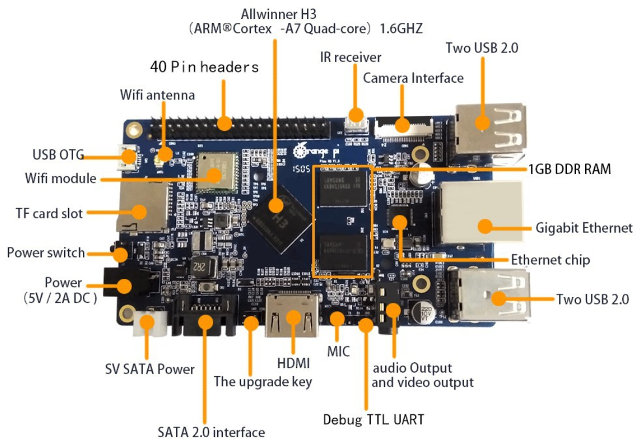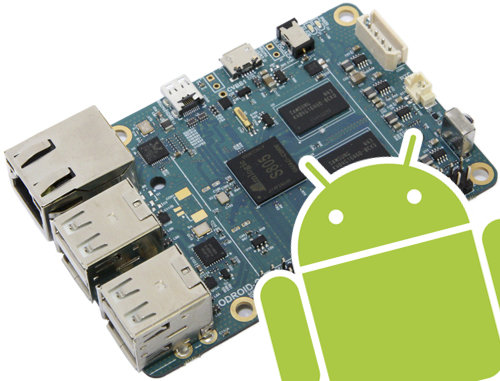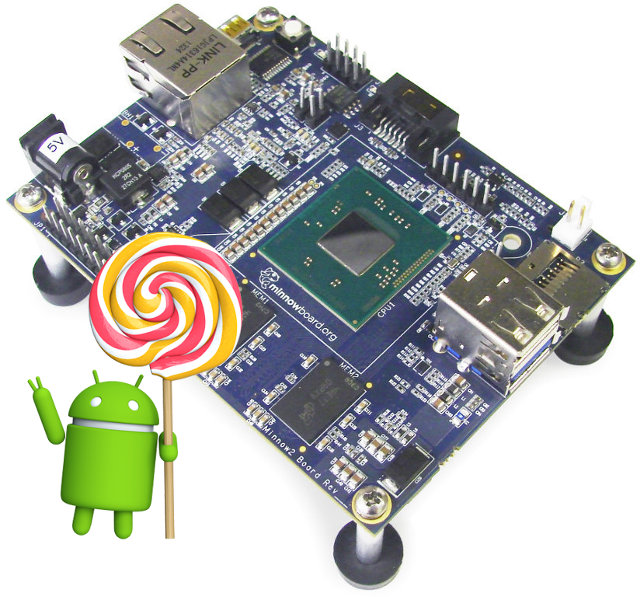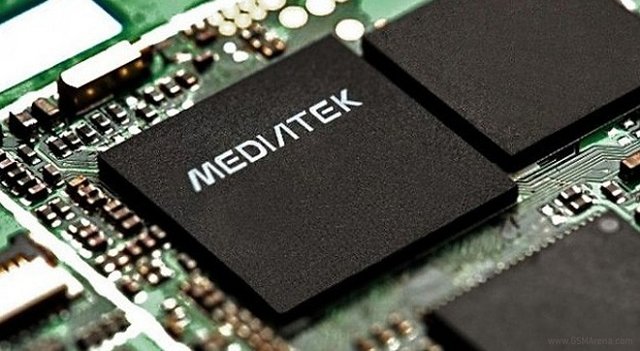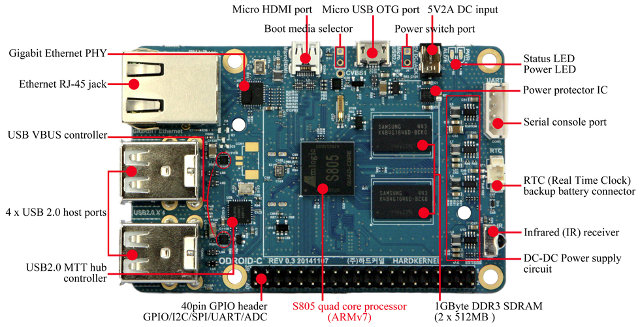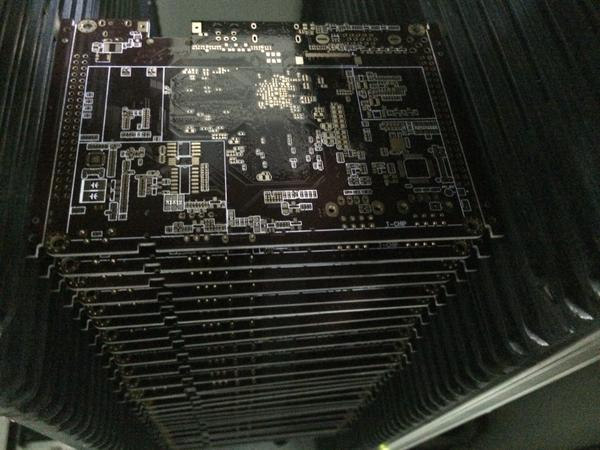Orange Pi Plus is a development board based on the new Allwinner H3 quad core Cortex A7 processor that supports 4K video output and decoding. The boards comes with 1GB RAM, 8GB eMMC, HDMI output, Gigabit Ethernet, Wi-Fi, SATA and more, and sells for $49 on Aliexpress. When I first covered the board in February, it was already listed on Aliexpress, but I could not find any firmware image, or source code, but this has now changed. There are now four firmware files: Lubuntu_1404_For_OrangePiplus_v0_8_0_.img.xz – Lubuntu 14.04 image Raspbian_For_OrangePiplus_v0_8_0.img.xz – Raspbian for Allwinner H3 orangepi-plus-debian-server-card-v0.9.img.xz – A Debian server image sun8iw7p1_android_orangepi-plus_uart0.rar – Android 4.4.2 image that needs to be flash with PhoenixCard in Windows (Linux tools are not working yet) Beside the firmware images, the company also releases a Linux SDK (h3-lichee-1.0.tar.gz) with Linux 3.4 kernel source code, u-boot, and relevant tools. I assume these should also work on Orange […]
Android 4.4 Source Code Released for ODROID-C1 Board
ODROID-C1 development board was launched on December 10, 2014, and a few days later U-boot and Linux source code was released for this low cost Amlogic S805 board, but Android was only due later due to licensing issues. I’ve just noticed Hardkernel uploaded Android 4.4 source code to github at the end of February. The build instructions are provided on ODROID-C1 wiki, and there are quite straightforward. You’ll need to type four command lines to get the code in a working directory:
|
1 2 3 4 |
mkdir odroid-c1 cd odroid-c1 repo init -u https://github.com/hardkernel/android.git -b s805_4.4.2_master repo sync |
and three more to build an Android image:
|
1 2 3 |
source build/envsetup.sh lunch odroidc-eng make -j8 |
All relevant binary files (system, userdata, bootloader, kernel…) will be located in out/target/product/odroidc/ directory, and can be flash to your board via fastboot. Alternatvely, you can create an Android SD card image (out/target/product/odroidc/selfinstall-odroidc.bin) with:
|
1 |
make selfinstall |
That means developers will be able to easily customize source code for ODROID-C1 board, but they should also be able use this base […]
Android 5.0 Binary and Source Code Release for Minnowboard MAX
Yet another development board gets a Lollipop update with Minnowboard MAX powered by Intel Atom E3815 or E3825 Bay Trail-I processor. Intel’s android-5.0.1_r1-ia0 release uses a 64 bit kernel and a 32 bit userspace, and supports all on-board peripherals such as Ethernet, HDMI (digital Audio + Video), USB host, SATA, I2C+SPI, GPIO, PWM and UART. New features and improvements features for this release include: Digital audio support using HDMI and USB. Linux console on serial port for debugging purposes. Android can be installed on SDCard, USB Stick or SSD. Android Runtime (ART). Material Design UI. Bluetooth 4.0 support using an external USB dongle. SELinux runs in enforcing mode. User data is encrypted by default. Bug fix – GPIO support The image is intended for developers interested in working with Android 5.0 on MinnowBoard MAX, but it does not have all the components to meet Android Compatibility requirements. If you own […]
Patchsets for Nvidia Tegra K1 “Denver” Submitted to Linux Mainline
Some patchsets have been submitted for Nvidia Tegra 132 a few days ago to the Linux ARM Kernel mailing list. Tegra 132 is the codename for the 64-bit version of Tegra K1, and they’re also a mention of Norrin64 FFD board, that should be a Chromebook reference design.
|
1 2 3 4 5 6 7 8 9 10 11 12 |
diff --git a/include/soc/tegra/fuse.h b/include/soc/tegra/fuse.h index 8e1249474e84..b5f7b5f8d008 100644 --- a/include/soc/tegra/fuse.h +++ b/include/soc/tegra/fuse.h @@ -21,6 +21,7 @@ #define TEGRA30 0x30 #define TEGRA114 0x35 #define TEGRA124 0x40 +#define TEGRA132 0x13 #define TEGRA_FUSE_SKU_CALIB_0 0xf0 #define TEGRA30_FUSE_SATA_CALIB 0x124 |
Tegra114 and Tegra124 are the codename for Tegra K1 32-bit processor with Tegra124 clocked at a higher frequency. Norrin64 board dts does not seem included in the patchsets, but it’s available from Chromium OS code, and shows it’s using 2GB RAM too. That also means Chrombooks like Acer Chromebook 13 (CB5) or HP Chromebook 14 with the 32-bit version of the Tegra K1 might soon get an upgrade to the 64-bit version. Thanks to David for the tip. Jean-Luc Aufranc (CNXSoft)Jean-Luc started CNX Software in 2010 as a part-time endeavor, before quitting his job as a software engineering manager, and starting […]
Mediatek MT8173 Quad Core big.LITTLE ARM Cortex A72/A53 Processor Code Submitted to Linux Mainline
[Update: MT8173 processor has now been announced, and it’s using Cortex A72 and A53 instead of A57/A53, as initially shown in the Linux kernel source code] Mediatek is not exactly known to compliant with open source licences, or be involved with the open source community. But the company is certainly going into the right direction with their cooperation with Google leading to source code release for Android One smartphones, and the recently launched Mediatek Labs for community projects, starting with LinkIt One IoT platform. Mediatek is also regularly submitting code to the Linux ARM Kernel mailing list, and yesterday code was submitted for Mediatek MT8173 SoC, a 64-bit ARMv8 processor with two Cortex 53 and two Cortex 57 cores in big.LITTLE configuration. As far as I know, it could be the first Mediatek SoC with “big” Cortex A57 cores. Code snippet from mt8173.dtsi related to CPU cores:
|
1 2 3 4 5 6 7 8 9 10 11 12 13 14 15 16 17 18 19 20 21 22 23 24 25 26 27 28 29 30 31 32 |
cpus { + #address-cells = <1>; + #size-cells = <0>; + + cpu0: cpu@0 { + device_type = "cpu"; + compatible = "arm,cortex-a53"; + reg = <0x000>; + enable-method = "psci"; + }; + + cpu1: cpu@1 { + device_type = "cpu"; + compatible = "arm,cortex-a53"; + reg = <0x001>; + enable-method = "psci"; + }; + + cpu2: cpu@2 { + device_type = "cpu"; + compatible = "arm,cortex-a57"; + reg = <0x100>; + enable-method = "psci"; + }; + + cpu3: cpu@3 { + device_type = "cpu"; + compatible = "arm,cortex-a57"; + reg = <0x101>; + enable-method = "psci"; + }; + }; |
A short […]
Linux 3.18 Released
Linus Torvalds released Linux Kernel 3.18 last Sunday: It’s been a quiet week, and the patch from rc7 is tiny, so 3.18 is out. I’d love to say that we’ve figured out the problem that plagues 3.17 for a couple of people, but we haven’t. At the same time, there’s absolutely no point in having everybody else twiddling their thumbs when a couple of people are actively trying to bisect an older issue, so holding up the release just didn’t make sense. Especially since that would just have then held things up entirely over the holiday break. So the merge window for 3.19 is open, and DaveJ will hopefully get his bisection done (or at least narrow things down sufficiently that we have that “Ahaa” moment) over the next week. But in solidarity with Dave (and to make my life easier too 😉 let’s try to avoid introducing any _new_ […]
Hardkernel ODROID-C1 is a $35 Development Board Powered by Amlogic S805 Quad Core Processor
Amlogic S805 is a quad core Cortex A5 processor which has found it way into low cost devices such as MK808B Plus TV Stick which can be purchased for as low as $30, or full-sized TV box such as MXQ S85 or MINIX NEO X6. All this low cost devices are nice, but the full source code is not available in your want to adapt them to your need. Luckily, Amlogic releases both an Android SDK, and a buildroot for Linux with GPU and Video Processing Unit (VPU) support, so Hardkernel decided to go ahead, designed a board, and has just launched ODROID-C1 quad core development board for just $35, or the exact price of a Raspberry Pi Model B+, but with much greater specs. ODROID-C1 specifications: SoC- Amlogic S805 quad core Cortex-A5 processor with a Mali-450MP2 GPU (2x fragment cores + 2x vertex shader cores) System Memory – 1GB […]
Firefly-RK3288 Development Board in Mass Production, Selling for $140
Firefly-RK3288 development board has been an interesting, yet confusing story, at least to me. We’ve first heard about the Firefly board on July, but I was privately told in September that the board would only be sold in China by a T-Chip sales person, only to see it become available for $189 on Ebay, as well as on Taobao a few days later. But those first boards may have only been engineering sample, or more likely from a limited trial runs, as the company has now announced mass production had started. Let’s refresh our memory with the specifications: SoC – Rockchip 3288 quad core ARM Cortex A12 / A17 up to 1.8 GHz with Mali-T764 GPU supporting OpenGL ES 1.1/2.0 /3.0, and OpenCL 1.1 System Memory – 2G DDR3 Storage – 16 GB eMMC flash + micro SD slot Video Output HDMI 2.0 up to 3840×2160@60p VGA out (D-SUB connector) Dual MIPI, Dual LVDS and and […]


